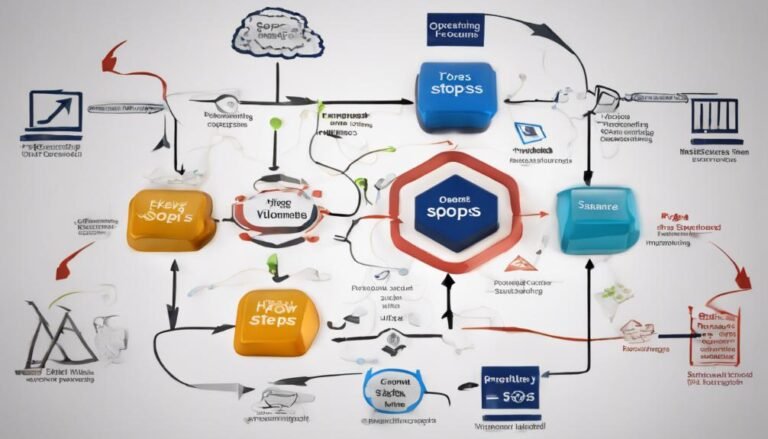Using Blockchain Technology
When you utilize blockchain technology, you harness unparalleled security, transparency, and efficiency in transactions. This innovative approach is reshaping various industries like finance and supply chain management, offering benefits such as heightened data security, streamlined processes, and increased trust levels. The decentralized nature of blockchain guarantees unparalleled safety and reliability, making it a game-changer in today's digital landscape.
Key Takeaways
- Enhanced security and transparency in transactions.
- Immutable audit trails for transparent data transactions.
- Real-time tracking of transactions for trust.
- Automated contract execution for efficiency.
- Decentralized agreement enforcement for trust.
Advantages of Blockchain Technology
When utilizing blockchain technology, you achieve a heightened level of security and transparency in your transactions. Data authentication is one of the key advantages of blockchain technology. Each block in the chain contains a unique code called a cryptographic hash that verifies the integrity of the data it stores. This process guarantees that once data is recorded in a block, it can't be altered without being detected, providing a secure method for authenticating information.
Digital identity is another significant benefit of blockchain technology. Through the use of cryptographic keys, individuals can create a secure digital identity that allows for efficient verification without the need to disclose unnecessary personal information. This not only enhances privacy but also reduces the risk of identity theft and fraud.
Blockchain in Finance
Implementing blockchain technology in finance revolutionizes traditional financial systems by introducing enhanced security, transparency, and efficiency. Blockchain's decentralized nature ensures that financial transactions are secure and immutable, reducing the risk of fraud and cyber attacks.
The transparency of blockchain allows for real-time tracking of transactions, promoting trust between parties and reducing the need for intermediaries. Additionally, the efficiency of blockchain enables faster and cheaper cross-border payments compared to traditional methods.
When it comes to cryptocurrency regulation, blockchain technology provides a transparent and traceable way to monitor transactions, aiding regulators in combating money laundering and fraud. The decentralized nature of blockchain also challenges conventional financial systems by offering alternatives to traditional banking services, impacting how financial institutions operate.
Furthermore, blockchain enhances financial data integrity by securely storing information in a tamper-proof manner, ensuring that data remains accurate and unaltered. This integrity is vital for financial institutions to maintain trust with their clients and comply with regulatory requirements.
Supply Chain Applications
Blockchain technology's impact extends beyond finance to transform supply chain operations, offering new possibilities for transparency and efficiency. When it comes to supply chain applications, blockchain technology revolutionizes the way businesses track inventory and authenticate products.
Here are four key ways blockchain enhances supply chain management:
- Immutable Inventory Tracking: Utilizing blockchain for inventory tracking guarantees that every movement of goods is securely recorded, providing a transparent and tamper-proof history of each product's journey.
- Enhanced Product Authentication: With blockchain, verifying the authenticity of products becomes seamless. By creating unique digital identities for each item and recording their entire production process on the blockchain, counterfeit products can be easily identified.
- Streamlined Supply Chain Efficiency: Blockchain enables real-time visibility into the supply chain, reducing delays and optimizing processes by automating tasks such as payments and compliance checks.
- Increased Trust and Collaboration: By fostering trust through transparent and secure transactions, blockchain encourages collaboration among supply chain partners, leading to improved relationships and operational efficiency.
Security and Transparency Benefits
You can benefit immensely from blockchain technology through enhanced data security, ensuring that your sensitive information remains protected from unauthorized access.
The immutability of transaction records on the blockchain guarantees transparency and accountability, fostering trust among all parties involved.
As a result, utilizing blockchain can greatly elevate the levels of trust and security in various industries and applications.
Enhanced Data Security
By leveraging blockchain technology, organizations can greatly enhance their data security, ensuring both transparency and protection against unauthorized access. When it comes to enhanced data security, blockchain offers a range of benefits that go beyond traditional methods.
Here are four key ways blockchain technology improves data security:
- Data Encryption: Blockchain uses advanced encryption techniques to secure data. Each block in the chain is encrypted and linked to the previous block, making it extremely difficult for unauthorized parties to tamper with the information.
- Cybersecurity Measures: Blockchain provides robust cybersecurity measures such as decentralized consensus mechanisms and cryptographic hashing, which add layers of security to the data stored on the network.
- Immutable Audit Trails: Through its immutable nature, blockchain creates a transparent and tamper-proof audit trail of all data transactions, enabling organizations to track any changes made to the data.
- Decentralized Storage: By distributing data across a network of nodes, blockchain eliminates single points of failure, reducing the risk of data breaches and ensuring data availability even in the face of cyberattacks.
Immutable Transaction Records
Utilizing immutable transaction records within a blockchain network provides unparalleled security and transparency benefits for organizations seeking to safeguard their data and operations. The permanence of data within a blockchain guarantees data integrity by preventing any unauthorized alterations, enhancing trust in the information shared. Transaction verification is streamlined as each block contains a unique cryptographic hash of the previous block, creating a chain of blocks that are interconnected. This process makes it nearly impossible for fraudulent activities to occur as any change in one block would require altering all subsequent blocks, which is computationally infeasible.
To highlight the significance of data integrity and transaction verification in blockchain technology, consider the following table:
| Benefits of Immutable Transaction Records |
|---|
| Enhanced Security |
| Data Integrity |
| Transparency |
| Reduced Fraud |
| Streamlined Audits |
Increased Trust Levels
Boosting trust levels through the implementation of blockchain technology is essential for organizations aiming to elevate their security and transparency standards.
When considering the incorporation of blockchain for increased trust levels, several key benefits arise:
- Immutable Ledger: Blockchain's decentralized nature guarantees that once data is recorded, it can't be altered or deleted, providing a secure and transparent system for all transactions.
- Enhanced Security: The cryptographic principles in blockchain technology make it highly secure, reducing the risk of data tampering or unauthorized access, thereby enhancing the overall trustworthiness assessment.
- Smart Contracts: Automation through smart contracts ensures that agreements are executed as intended, improving credibility enhancement and fostering trust among parties.
- Transparency: Blockchain allows for real-time visibility into transaction histories, enabling stakeholders to verify information independently, thereby increasing overall trust levels within the ecosystem.
Smart Contracts Implementation
You can harness the power of blockchain technology through smart contracts implementation.
Automated contract execution and decentralized agreement enforcement are at the core of this innovation.
This approach streamlines processes, minimizes human error, and enhances trust in transactions.
Automated Contract Execution
Automated contract execution through the implementation of smart contracts revolutionizes the traditional contract process by streamlining and automating key agreement terms and actions using blockchain technology. By integrating AI capabilities, smart contracts can enhance decision-making processes and offer real-time insights, ensuring efficient contract management.
Efficiency:
Smart contracts automatically execute predefined actions when specific conditions are met, reducing manual intervention and streamlining processes.
Transparency:
Utilizing blockchain technology, smart contracts provide an immutable and transparent record of contract terms and execution, enhancing trust between parties.
Cost Reduction:
Automation through smart contracts minimizes the need for intermediaries, reducing costs associated with contract execution and administration.
Regulatory Compliance:
Smart contracts can be designed to incorporate regulatory requirements, ensuring that contract execution adheres to legal standards and mitigating compliance risks.
Implementing smart contracts for automated contract execution offers a forward-looking approach that optimizes operational workflows and fosters secure and efficient agreement management.
Decentralized Agreement Enforcement
Utilizing blockchain technology for decentralized agreement enforcement involves implementing smart contracts to autonomously execute and enforce contractual terms, enhancing security and trust in transactions. Smart contracts are self-executing agreements with the terms of the contract directly written into code. They operate based on predefined rules and trigger actions automatically once conditions are met. This automation reduces the need for intermediaries, streamlining processes and reducing costs.
In this decentralized environment, consensus mechanisms play an essential role in validating transactions and guaranteeing agreement enforcement. These mechanisms, such as Proof of Work or Proof of Stake, enable network participants to agree on the state of the blockchain without the need for a central authority.
Governance models within decentralized applications help manage decision-making processes and ensure that the network functions smoothly. The token economy is another key aspect, where tokens are used to incentivize network participants and facilitate transactions within the ecosystem.
Future Trends in Blockchain
Emerging developments in blockchain technology are shaping the future landscape of digital transactions and data security. As you explore the world of blockchain's future trends, there are several key areas to keep an eye on:
- Interoperability: Enhancing the ability of different blockchain networks to communicate and interact seamlessly will be important for widespread adoption and efficient data exchange.
- Scalability Solutions: Innovations aimed at improving blockchain scalability, such as sharding and layer-two solutions, will be pivotal in accommodating the increasing number of transactions on blockchain networks.
- Enhanced Security Measures: With cybersecurity threats on the rise, advancements in encryption techniques and authentication methods will play a significant role in fortifying blockchain systems against potential attacks.
- Integration with IoT and AI: The integration of blockchain with the Internet of Things (IoT) and Artificial Intelligence (AI) technologies will open up new possibilities for predictive analytics and automation, revolutionizing industries like supply chain management and data analysis.
Stay abreast of these trends to navigate the evolving landscape of blockchain technology effectively.
Conclusion
To sum up, leveraging blockchain technology provides numerous advantages in different industries, such as finance and supply chain management.
The integration of smart contracts enhances security and transparency, resulting in improved efficiency and cost savings.
By 2021, the global blockchain market is expected to reach a value of $23.3 billion by 2023, indicating the increasing significance and uptake of this innovative technology in the corporate realm.








